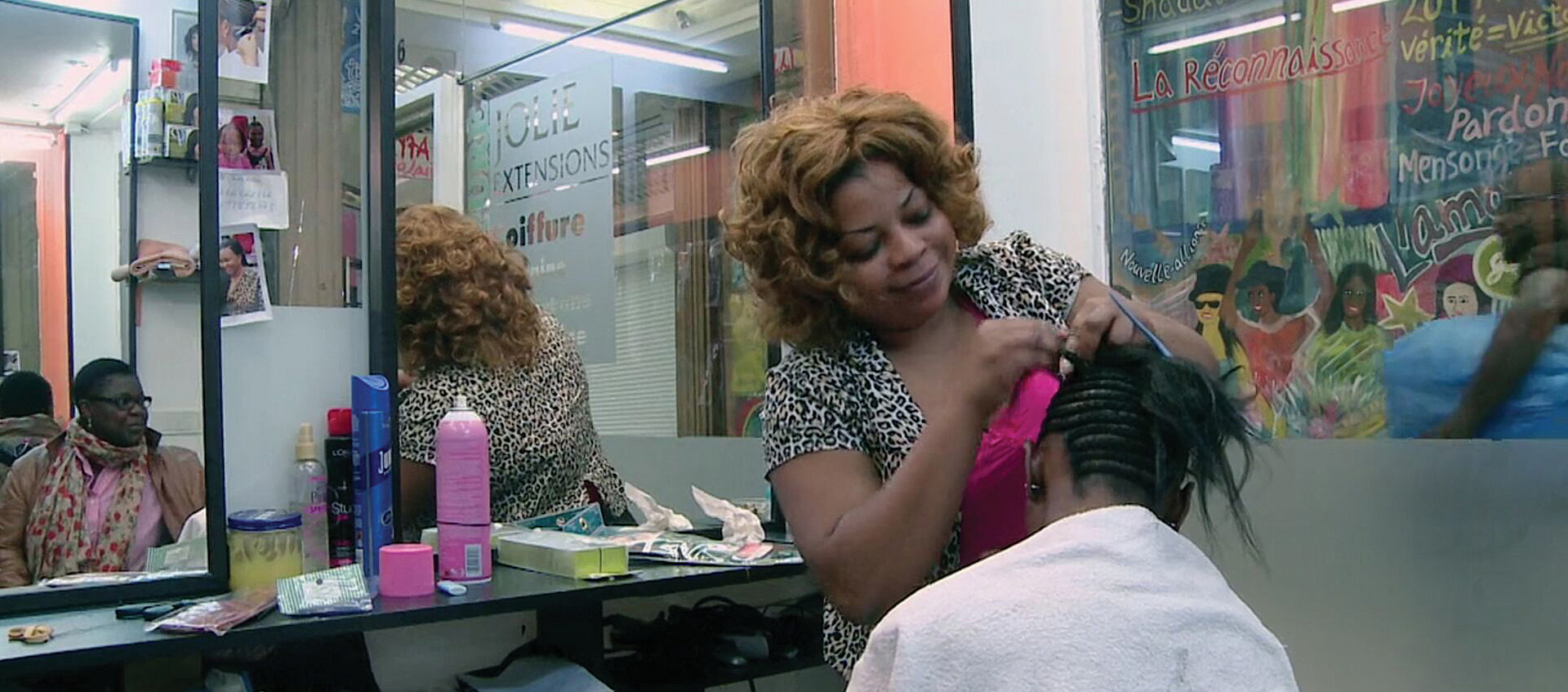Chez Jolie Coiffure (Rosine Mfetgo Mbakam, 2018): Belgium
Reviewed by Shayne Casso-Cloonan. Viewed at the AFI Festival 2019.

As the most realistic film that I viewed at the AFI Festival 2019, Chez Jolie Coiffure is a beautifully simple documentary film that shows all of the possible ins and outs of a small Brussels based hair salon. Whole-heartedly created by filmmaker Rosine Mfetgo Mbakam, we get full view of salon owner Sabine, as she braids, gossips and curses during her regular business hours. Sabine refers to Mbakam multiple times throughout the film, but we never actually see her. Mbakam taped the entirety of the film behind the camera, by herself. She found many creative ways to film her salon subjects, which was necessary judging by how small the space was. There were great shots of her subjects being filmed through the salon mirrors or from low angles, giving the audience the best possible view.
Starting out, it seems that these women are just hanging around, living out their lives, gossiping, eating and having fun, but we are gradually introduced to the fact that many of them are in Belgium illegally, hence no last name being listed for Sabine on any of the film’s websites. We find out that many of the subjects have been through some incredibly intense situations while making their journeys from Cameroon and other African countries. Part of what made this stick out to me so much is that Sabine greatly emphasized the difficulty of her journey. She said that if you were traveling and you fell ill, then you would hope that the police would find you, as it would only be that much worse to die alone in that situation. With this, she attributes her present success to God, stating: “God is life. God is love.”
For obvious reasons, Sabine, along with the other women in the salon, find there to be a great disparity between themselves and the white people they are often surrounded by. The salon is located in a large marketplace, and the front wall of the salon is actually a large window looking out to one of the market walkways. Because of this large window, passersby often stop to look and stare at what the women are doing in the salon, because of course it is incredibly intriguing, but Sabine understandably doesn’t feel appreciative of this, at one point saying, “move on whites! If you go to the zoo, you pay!” She goes on to explain: “White people aren’t our friends, mama…the whites look at us as if we are dogs…you can tell, they want to burn us all.” Part of the reason she makes the point that white people want to burn them is because she often hears of other black women chemically lightening their skin and/or going through plastic surgery is order to create more European-like features.
The women talk about missing home, but are nervous about leaving Belgium with the potential to not get back into the country later. Sabine hopes that nothing bad will happen to anyone she loves back in Cameroon while she is in Belgium, and in these moments the camera has an extended stay on her face. One of the other women ask her: “Are you going home this year, Sabine?” and she simply answers: “I don’t know.” Mbakam ends the film here, and it is a perfect ending because it really makes you think about what life is like for someone with a different perspective. To me, their life experiences were so foreign, but exposing these harsh topics makes room to bring attention to the issues at hand. For anyone with an hour and 11 minutes, and an open mind to new ideas, I would recommend that you watch this.
About this entry
You’re currently reading “Chez Jolie Coiffure (Rosine Mfetgo Mbakam, 2018): Belgium,” an entry on Student Film Reviews
- Published:
- 11.25.19 / 10pm
- Category:
- AFI Filmfest 2019, Films
No comments
Jump to comment form | comments rss [?]